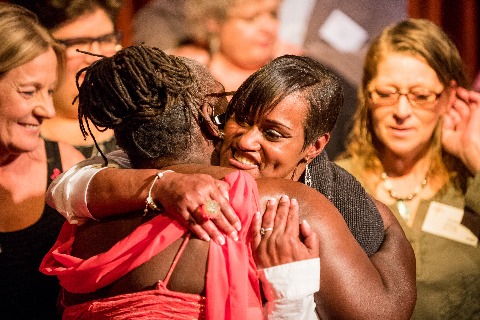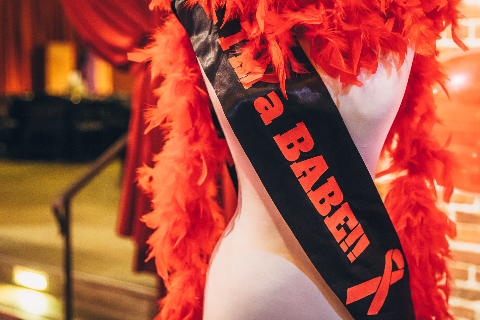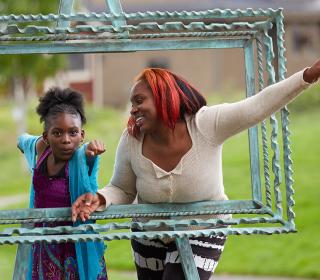When thinking about the types of systems that perpetuate oppressions like racism and sexism, the healthcare industry plays a major role. While many health professionals strive to improve the quality of life for their patients, their own internalized biases can often impact their work. This concept of medical racism is one that we’ll dive into later this month.
In the meantime, one solution when faced with inequitable systems is to build your own network of support. BABES Network is YWCA’s peer support program for women living with HIV and works to reduce isolation, promote self-empowerment, enhance the quality of life, and serve the needs of women living with HIV.
The following is a transcript from a video of the day in the life of Lakesha, a former YWCA program participant and current BABES Network member.

I wake up every day, I do the same things that any other person would do in life. My typical day is I wake up around about 6:30 in the morning. Don’t know why I wake up so early but I do. Around about 7:30 a.m. I wake [my partner] Raymond up and he tells me he’s not ready to get up, so then I make coffee. After I make coffee, he goes back to sleep.
You know, Raymond don’t even have HIV, but he takes five pills a day. I take one pill and that’s like taking a vitamin every day for me.
I met Raymond in 2012. I was living at YWCA then. As time went on, I was liking him more and more and more and it was in my mind that, “Okay, I have HIV.” I knew that he didn’t have HIV so I was like, “When do I tell him? Or DO I tell him?”
So, Raymond was just sitting there. I said, “Raymond, I got to tell you something.” He was like, “Well, what? What is it?” because he was waiting for like a day and a half for me to tell him what I had to tell him. So I was like, “Well, I got HIV” and he started crying. He asked my doctor, “Well, how long does she have left to live?” You know, I looked at him and I’m like, “People don’t die from that no more.” He was back in the 1980’s with his thinking of HIV.
He was like, “I’m not asking you. I’m asking your doctor” and my doctor said, “Exactly what she just told you.” Raymond was like, “I want to be with her. I still want to be with her,” so my doctor told him about a drug called PrEP because he’s HIV negative. He was like, “Sure, I’ll get on it.” He then got on PrEP and found out all about HIV. We’ve been together for three, almost four years and everything is going great. I’m happy we’re still together.
Roxy, my dog, has been my lifesaver. When I first got Roxy, I was still addicted to drugs. She has been with me through the days that I cried; she has been with me through all my struggles.
I found out about BABES through word of mouth. When I first got to BABES, I met [former Program Manager] Nicole and she was just a smiling face, welcoming. I was like, “Okay, this place is cool.” That’s when I learned about my disease. That’s when I learned about HIV. Because [BABES] talk to you about it, they find out where you’re at, they find out how you’re dealing with it. They have groups like support groups and you learn about your disease.
The type of support that I get from BABES is emotional support. I love BABES because you can go there and talk to them about anything. It’s all women. You don’t want to go in there and necessarily talk to men about your sex problems or the problems you’re having with your inner body. There’s women there and they really care.
I go talk to my case manager at BABES and I like talking to her. We just talk about whatever’s going on in my life at the time, problems I’m having, etc. There are people there that will really work with you, as long as you’re trying to help yourself. Nobody in this world is just going to give you anything, but if you’re trying to help yourself, then there’s people out there that are going to help you.
My fall routine is I get ready for school, I go to school, and I stay in school all day long. My experience in going back to school has been hard, stressful, scary, and terrifying. For real. I hadn’t been to school in like twenty years and I was like, “Oh my goodness. Math! My goodness...”
Once I got in school and my body was clean from drugs and I was healthy as far as my HIV, and everything was going right, my mind really just picked up from where I left off in school. Since I’ve been in school, I’ve been on the dean’s list and it just comes from hard work. If you really want something in life, you’ll get it if you work hard at it.
When I get out of school in the spring, I’ll have my AA degree in Chemical Dependency. I really want to be a social worker. I want to have my Master’s one day so that I can change policies for people with addiction problems, plus people with HIV.
I think I’m still on the right path because I had support, help, and loving people around me who really showed me they cared. They helped me with my problems; they helped me with anything that I needed help with. I’ve living life like anybody else would live life.
That’s it. That’s my typical day. Whenever I go to sleep, I go to sleep. If I wake up, I do it all over again the next day.
We thank Lakesha for sharing her story are helping our community understand the first-hand experience of YWCA’s work.
If the concept of medical racism is new to you, stay tuned for our explainer blog post later this month. You can check out the hashtag #MedicalRacism on Twitter and read a roundup of Black women’s experiences in healthcare to hear more first-hand stories.

Annalee Schafranek is the Marketing & Editorial Director at YWCA. She contributes agency news, press releases, and media coverage to the website. Annalee’s educational and professional experience has always focused on the place where gender equity and media meet.
We share the stories of our program participants, programs, and staff, as well as news about the agency and what’s happening in our King and Snohomish community.

